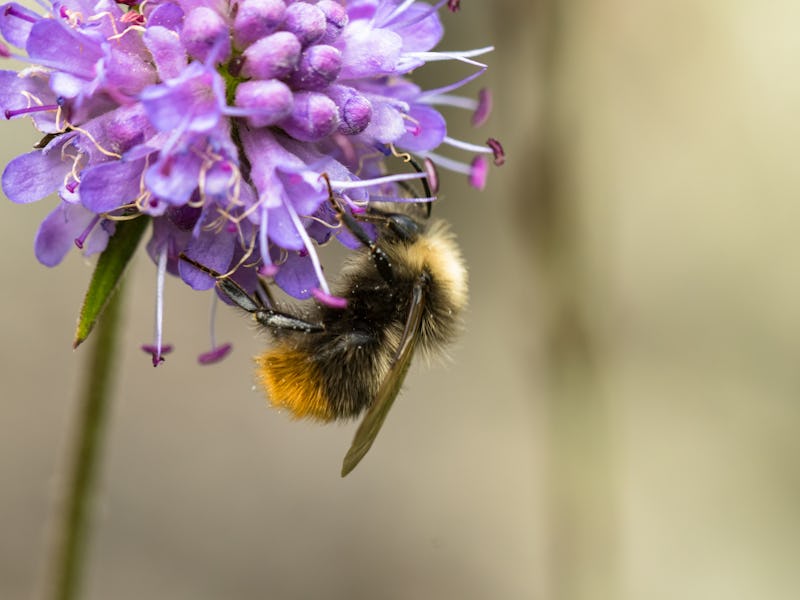Baby bee brain scans are bad news for humans
Using microCT scans, scientists reveal the lasting damage pesticides can do to bees' brains.

Using an innovative technique to scan the minuscule brains of baby bees, scientists have reported just how pesticides damage the brains of infant bumblebees.
And the story should, uhh, sting us humans a little, too.
In a new study, researchers describe how they tested baby bees exposed to pesticides by putting them in a teeny computed tomography (CT) machine — essentially a miniaturized version of the donut-shaped device you may have seen used to scan humans' brains.
The bees were exposed during their larval stage to a common pesticide used on farms across the world. The exposed bees had significantly impaired learning abilities as adults compared with pesticide-free bees. The results suggest the pesticides interfered with the bees' brain development — with potentially harmful consequences for humans.
Pollinators like bees and butterflies “work for humans at no cost,” Italian researcher Matteo Dainese told Inverse in October 2019, after his study revealed why preserving pollinators is critical to successful farming and our food supply.
If bees' brain development is disrupted, it could result in problems down the line in foraging for food, and by extension, pollinating the plants we depend on for vital sustenance, too.
“In many ways, nature is an outstanding service provider for agriculture,” Dainese said.
Scanning baby bees
To do the study, the researchers spiked bees' nectar with pesticides belonging to a class called neonicotinoids. The chemicals are used widely worldwide.
After the pupal bees hatched, researchers measured their learning abilities after 3 and 12 days. They tested the bees to see if they were able to associate a certain smell with a food reward. Pesticide-exposed bees performed worse than bees which were not exposed at both time benchmarks.
The scientists then scanned about 100 of the bees' brains using a micro-CT machine to see if there were any changes in the exposed bees' brains that might be driving their poor performance. What they found was telling: An important part of the insect brain, called the mushroom body, was significantly smaller in the pesticide-exposed bees than in the controls.
Researchers analyzed micro-CT scans of bee brains to study the effects of pesticides.
Study lead author Richard Gill, a senior lecturer at Imperial College London, said the scans provide clear evidence that pesticides change bee brain development.
"Worryingly in this case, when young bees are fed on pesticide-contaminated food, this caused parts of the brain to grow less,” Gill said in a statement.
As a result, the bees grow to have "smaller and functionally impaired brains; an effect that appeared to be permanent and irreversible," he said.
The unusual study was published on Wednesday in the journal Proceedings of the Royal Society B.
Bees: Big players in human agriculture
Older research tends to focus on the effects of pesticides on adult bees — this is the first study of its kind to scan the brains of extremely young bees and show how early effects of eating contaminated food may affect bees down the line on a colony level.
"Bee colonies act as superorganisms, so when any toxins enter the colony, these have the potential to cause problems with the development of the baby bees within it,” Gill said.
Outside of their own colonies, bumblebees are an important pollinator, both in natural ecosystems and in human-built agriculture. So we humans have a high stake in their development, too.
According to the US Department of Agriculture, 35 percent of the world's food crops rely on animal pollinators like bees.
Globally, agriculture faces major threats from climate change, compounded by a rapidly growing population. That hard truth means we need to get serious about sustainable land use — and how we are going to feed all these people without destroying the planet.
Some 35 percent of the world's food crops rely on animal pollinators like bees, according to the US Department of Agriculture.
Knowing how pesticides disrupt bee brain function, Gill says, can help researchers understand how these chemicals affect entire colonies of bees over time. In turn, that can help set better regulations on pesticide use.
"These findings reveal how colonies can be impacted by pesticides weeks after exposure, as their young grow into adults that may not be able to forage for food properly,” Gill said. “Our work highlights the need for guidelines on pesticide usage to consider this route of exposure."
Abstract: For social bees, an understudied step in evaluating pesticide risk is how contaminated food entering colonies affects residing offspring development and maturation. For instance, neurotoxic insecticide compounds in food could affect central nervous system development predisposing individuals to become poorer task performers later-in-life. Studying bumblebee colonies provisioned with neonicotinoid spiked nectar substitute, we measured brain volume and learning behaviour of 3 or 12-day old adults that had experienced in-hive exposure during brood and/or early-stage adult development. Micro-computed tomography scanning and segmentation of multiple brain neuropils showed exposure during either of the developmental stages caused reduced mushroom body calycal growth relative to unexposed workers. Associated with this was a lower probability of responding to a sucrose reward and lower learning performance in an olfactory conditioning test. While calycal volume of control workers positively correlated with learning score, this relationship was absent for exposed workers indicating neuropil functional impairment. Comparison of 3- and 12-day adults exposed during brood development showed a similar degree of reduced calycal volume and impaired behaviour highlighting lasting and irrecoverable effects from exposure despite no adult exposure. Our findings help explain how the onset of pesticide exposure to whole colonies can lead to lag-effects on growth and resultant dysfunction.